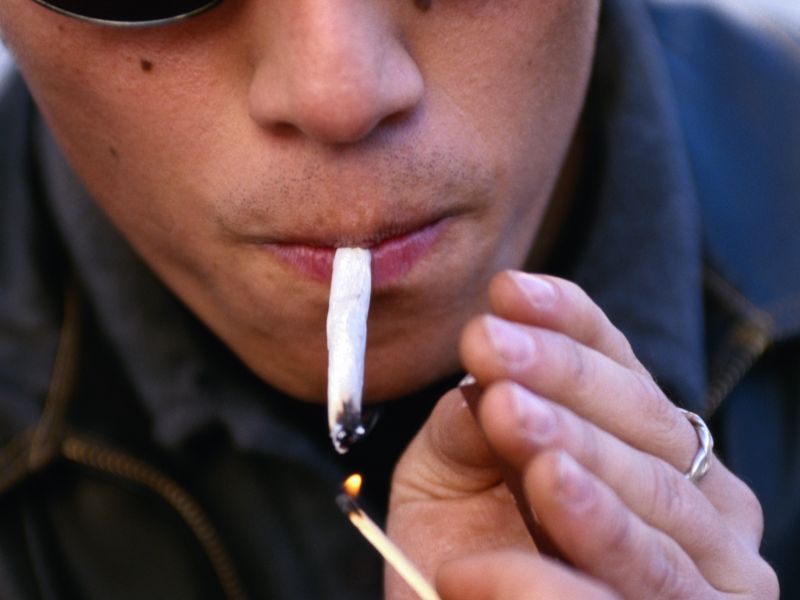Almost 1 in 10 Americans Has Lifelong Drug Problem
Federal study suggests only about one-quarter seek treatment for addiction
HealthDay Reporter

WEDNESDAY, Nov. 18, 2015 (HealthDay News) -- Nearly one in 10 Americans has some type of lifelong drug use disorder, a new federal government survey finds.
But only a quarter of them get the treatment they need, researchers said.
The findings stem from a large U.S. National Institutes of Health survey. It's the first survey based on updated mental health guidelines that set a higher bar for diagnosing drug addiction than previous guidelines.
"But the seriousness and persistence of the situation doesn't appear to have changed all that drastically since our last look at this," said study lead author Bridget Grant.
"What we see," Grant added, "is that a little over 23 million Americans are directly affected with a lifelong problem. And many more are affected when you consider that the issue involves not just the user but also the user's family and social network. And on top of that we also see that treatment rates are really not that great."
Grant, a senior investigator at the National Institute on Alcohol Abuse and Alcoholism's Laboratory of Epidemiology and Biometry, and her colleagues discussed the survey results in the Nov. 18 online issue of JAMA Psychiatry.
Drug use disorder occurs when the consistent use of a drug "causes clinically and functionally significant impairment, such as health problems, disability, and failure to meet major responsibilities at work, school, or home," according to the U.S. Substance Abuse and Mental Health Services Administration.
To get a snapshot of current national drug abuse patterns, the researchers conducted in-person interviews with more than 36,000 adults over age 18 between 2012 and 2013.
The survey focused on the use of marijuana, amphetamines, club drugs (such as Ecstasy), cocaine, hallucinogens, heroin, narcotic painkillers, sedatives/tranquilizers and solvents/inhalants. Drug use was assessed collectively, rather than broken down one by one. Drinking patterns weren't assessed at all.
Based on survey responses, the investigators determined that the general risk for having a lifelong drug use disorder was highest among whites, Native Americans, men, singles, people between 18 and 44, and those with lower incomes and educational backgrounds. The study also found that people with mental health illnesses, such as depression, bipolar disorder, PTSD, personality disorders, anxiety, panic and social disorders were more likely to have a lifelong drug use disorder.
The number of Americans estimated to have a lifelong drug use disorder was 10 percent, the study found. Those with a "12-month" drug use disorder -- meaning a current problem during the prior year -- was almost 4 percent, or more than 9 million adults, the researchers said. Less than 14 percent of these people were getting the appropriate treatment for their condition.
What's more, the researchers found that those struggling with a drug use disorder who do ultimately get treatment tend to initiate it long after their problem first begins. This means that while drug use disorders tend to first develop at around age 24, the average age of first-time treatment hovers around 28, the study noted.
Why? "A lot of people have concerns about the effectiveness of treatment, even though we've made a lot of strides over the past two decades," noted Grant. "And professionals, and even patients themselves, have a lot of problems simply identifying their problem. And also, of course, there's a stigma associated with admitting you have a drug problem. That's still a very, very big problem."
Dr. Adam Bisaga, a professor of psychiatry at Columbia University in New York City, thinks that surveys like Grant's could help turn the tide of drug abuse.
"The public will probably be surprised to know that the problem is so prevalent," he said, "because stigma keeps people silent and thinking they are all alone. But addiction is a disease with a well-established neurobiology, and treatments are now very effective, and promise a lot of help and relief. So surveys like this are important because they help get the message out that this is an issue that affects millions of people. And that in and of itself will help to abolish the stigma that surrounds the disease."
More information
There's more on drug use disorders at the U.S. Substance Abuse and Mental Health Services Administration.
SOURCES: SOURCES: Bridget F. Grant, Ph.D., senior investigator, Laboratory of Epidemiology and Biometry, U.S. National Institute on Alcohol Abuse and Alcoholism, U.S. National Institutes of Health, Rockville, Md.; Adam Bisaga, M.D., professor, psychiatry, Columbia University, New York City; Nov. 18, 2015, JAMA Psychiatry
Last Updated: Wednesday, November 18, 2015 1:05:37 PM EST
Copyright © 2015 HealthDay. All rights reserved.